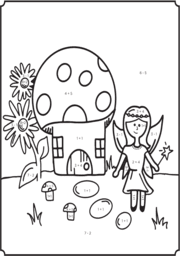The Cognitive Benefits of Math Coloring in Young Minds
Cognitive development begins right after birth. Then, from basic actions such as grasping, looking, and listening, they start to think symbolically. Later on, they learn to use words and pictures as representations of objects. It’s a fascinating process that shapes the way children perceive and interact with their surroundings.
Many factors affect such a development, especially during the preoperational stage, which happens around two to seven years old. One intriguing aspect of it is its relationship with mathematics. Yes, you heard that right! No wonder scholars have introduced math coloring to help young minds develop more effectively.
Math coloring is simply coloring with a mathematical twist. Remember those sheets with pictures or illustrations that relate to math problems or concepts? Chances are you’ve encountered them in your younger years, too.
But how exactly does math coloring impact cognitive development in young minds? Let’s explore below.
Why is cognitive skills development in early childhood important?
Before we try to discover the cognitive benefits of math coloring, let’s first understand why cognitive skills development is crucial, especially in early childhood. Well, that’s because it’s a critical period. At this stage, minds undergo rapid growth, and it’s also when humans form the building blocks of their intellectual abilities.
That’s why there are online learning platforms, like DoodleLearning, specifically targeting this stage in human development. Most of them offer free materials for different learning activities, including math coloring.
Specific Cognitive Developments Taking Place During Early Childhood Years
It’s during early childhood that things begin to catch your attention and you start to memorize events. Not only that, but it also marks the emergence of your ability to solve problems through critical thinking. There are many things happening in the cognitive area of your brain during this time as well, and these lay the foundation for future academic success. You’re preparing yourself for future social interactions, too.
The Impact of Successful Early Childhood Cognitive Skills Development
A 2022 study mentions that college students related their academic success to the revolutionary-relevant experiences they had from preschool to kindergarten years. What are these experiences? One good example, according to the same study, is hands-on learning. It follows developmentally appropriate practices. The National Association for the Education of Young Children defines it as play-based, joyful learning.
And that’s why, as a parent or educator, you can never go wrong prioritizing the development of cognitive skills in a child. The best way to do that? Provide opportunities for young minds to engage in cognitive growth-stimulating activities that make learning fun.
How important is math in cognitive development?
Next, let’s talk about math’s role in cognitive development. Obviously, the understanding and application of mathematical concepts can sharpen essential cognitive abilities, such as critical thinking and problem-solving. The big question is how it does that.
Specific Ways Math Influences Cognitive Development
Remember when you studied math concepts yourself, you learned to analyze problems and tried to identify patterns to come up with strategies for solving them? That’s an analytical and systematic approach to overcoming challenges in action!
Of course, math also promotes higher-order thinking skills that extend even beyond the subject. You also think logically and flexibly when trying to make connections in problem-solving activities, right?
And since math concepts involve shapes, patterns, and measurements, mathematics also helps with spatial reasoning ability development. The result? Improved visualization skills in young minds – a crucial skill for various everyday tasks like arranging furniture at home.
Integrating Math and Art
A lot of students perceive math as hard and boring. So, the next step is to make it as interesting as possible. One effective way of doing just that is integrating math and art through math coloring.
There are physical and even digital math coloring worksheets that feature mathematical tasks or patterns that a child can fill in with colors. How they use the colors will, of course, be based on their calculations or understanding of a certain mathematical concept. Sounds interesting, right?
Playful learning like math coloring indeed piques the interest of young learners and even enhances important skills such as communication and decision-making, as per the Federation of American Scientists in a 2023 publication.

Specific cognitive benefits of math coloring
There are several specific ways math coloring benefits cognitive development. These include:
- Attention and focus enhancement: Working on a math coloring sheet means concentrating on the task at hand. A child’s attentional capacity improves as a result.
- Spatial reasoning skills improvement: As already mentioned, math coloring also enhances a child’s spatial reasoning skills. Coloring in geometric shapes and patterns means recognizing and manipulating spatial relationships.
- Fine motor skills strengthening: When coloring, children hold pencils. Not only that, but they also have to make intricate movements when filling in small spaces. Doing so exercises the muscles and builds dexterity.
- Increased mathematical comprehension and retention: Colors and visual cues serve as math information memorization and recall aids. They make math coloring a multisensory and interactive learning activity. The result? A deeper understanding of mathematical concepts.
Whether you’re a parent or an educator, keep in mind that incorporating math coloring for cognitive development in children requires a supportive and positive environment. Allow a child to experiment. Celebrate their efforts even if they make mistakes along the way.
Conclusion
Math coloring makes learning mathematics enjoyable and effective. Beyond that, it has cognitive benefits that make a child more ready for the latter stages of life. It’s a valuable cognitive development tool any child is worth exposing to.





